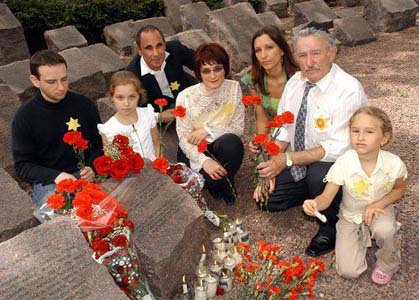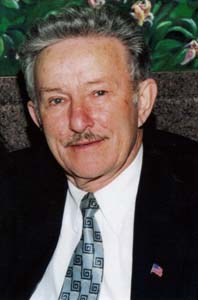

Проект «Голоса еврейских местечек. Могилевская область».פיתוח קשרי התרבות בין העמים של ישראל ובלרוס
|
|---|
Поиск по сайту |
|
MainNew publicationsContactsSite mapVitebsk regionMogilev regionMinsk regionBoris Roland
|
WHAT WE LIVED THROUGH IN 1941Meeting with NazisOn June 22nd 1941, at dawn, my friend Vasia and I went fishing. We usually never came back home without fish. In the afternoon, when we were coming back home, we heard passers-by mention the word “war”. Of course, back then we perceived that as children. We often used to play “war” and it sounded like another game. However, our parents saw it differently. During the days that followed tension was growing. Father’s brother Grisha and sister Fruma escaped from Glusk on the third day together with their families. They had their own horses. Our family also wanted to join them but we did not manage. On June 27th my elder brother Gilik and I went to visit our father at work. Right at the entrance of the building where father worked there was a car. We went to eat something and suddenly heard people in the street shouting “Germans!”. All the people dashed to the car. In the last moment father virtually pushed Gilik into the overfilled car and it disappeared. Meanwhile several German armored vehicles approached the building. The hatches were open and we could see the Germans sitting and smiling as if it was a parade. They moved to the center of the settlement and began looting the place. Vasia and I tried not to miss anything. Two Germans entered Maizus’ barber shop. Maizus offered to shave them and they agreed. At that time Ilya Klimchik, who could speak fairly good German. He started asking the Germans questions, which one of them answered willingly. - Is it true that Germans torture and murder Jews? - Nein, nein! It’s untrue. This is communist propaganda. Nevertheless, the first Jewish victim was made on the following day. Shlema Koltov, a park warden, did not like that Germans brought horses into the park, so he tried to make them leave the park. He was shot. The sadist performanceAs soon as Germans invaded, a Judenrat was created in Glusk. A list with the names of all the Jewish residents was made and the residents were forced to attach yellow marks to their clothes. All the capable Jewish residents had to work for the Nazis. The Nazi policemen and Germans in the village organized so-called “performances”. People said horrible things were happening there. One time, without getting my mother’s permission, I convinced Vasia to accompany me to one of such “performances”. We met and headed for the place where it took place. That time the “performance” took place in a former kindergarten. It was a warm August day. We saw a horrid picture. Nazis, wearing only underwear and holding rubber batons, forced their victims, Jewish men, to put horse manure into hats and carry it to the kindergarten fence. Meanwhile they were shouting and whipping their victims. Then another group of people had to carry the manure back to the place where it had been picked up. Barber Maizus was pointed a gun at and made to climb a pear tree. Then they ordered him to jump and shot at him… Then they made Avremul (I do not recall his last name) sit on a horseback with his face to the horse’s tail. The horse started running. When it was running under a rain shelter the man hit his head on the shelter roof and fell off. He remained lying there… One of the German sadists was patting a goat he had found somewhere. Thus he showed everyone that even a goat was a better creature than a Jew. The catastrophe of the Jews from GluskThus torture and executions became a norm in our everyday life. We were informed that on November 7th the Jews of Bobruisk ghetto had been executed. Nevertheless there was a glimmer of hope that our fate would be different.  Opening of memorial stone
Opening of memorial stonein the Memorial Holocaust park in Brooklyn, New York. Yuly Izenstat with children and granddaughters, 2005. On that fatal morning of December 2nd 1941 (on December 1st I turned 11) we were told that all the Jews, regardless of their age, had to come to the commandant’s office with all their documents and valuables. By that time father had already been taken to work. We all realized what would happen to us. Mother pressed me against her chest and did not let me go for a long time, feeling we would never see each other again. - Run to your father’s mill. Maybe you will survive. I will pray for you, - said she and pushed me outside of the house. Sister Masha was told to join me later. The street looked deserted – the day was only beginning. Next to the mill I spotted two armed German soldiers. I did not find father at the mill. It was about minus 20 degrees outside. I stayed inside the mill, hoping father would come back. About two hours later an armed Nazi policeman entered the mill and ordered everyone to go outside. The workers asked him whether they needed to take tools with them. They were told there was no need to do so. Outside we were met by another policeman and then ordered to start walking. I did not have a yellow mark on my clothes. In the moments of danger a person’s brain starts working much faster. Unexpectedly for myself I asked the policeman, who was walking behind me:  Yuly Izenstat.
Yuly Izenstat.
- Are you also taking Russians, or just Jews? - Who are you? - Russian! They were astonished. We stopped. I suspected they would not start checking me in such cold weather. - Why were you with the Jews? - I went in to keep myself warm. Mother had sent me to get a little flour. - Do you know this boy? – one of the policemen asked the workers. They did not give me away and confirmed everything I said. The policemen let me go. When I saw them disappear, I ran back to the mill in hopes of finding father and Masha there. There I found stoker Homka (Foma), who offered me to stay there and wait for news about my relatives. At midnight he woke me up and told me that father’s assistant Gerchik would soon be coming together with my father. They had been hiding in an old water discharge pipe on the mill. When father came, we left the village and stayed in my father’s friend’s house. There we found out that my mother and younger brother had been taken away by Nazis. We still had no information about Masha. While we were thinking were we could go, Masha showed up at the door. With tears in her eyes she told us about what had happened to mother, brother Semochka and grandmother. All in all, about 3000 Jews were executed in Glusk. About 70-75 people escaped the execution. Yuly Izenstat,
|
|||
|
|
Jewish settlements in Mogilev regionMogilev• Antonovka• Batsevichi• Belynichi• Belynkovichi• Bobruisk• Byhov• Chausy• Cherikov• Dashkovka• Dribin• Esmony• Glusk• Golovchin• Gorki• Gory• Grozdianka• Hotimsk• Kirovsk• Klichev• Konohovka• Kostukovichi• Krichev• Krucha• Krugloye• Lenino• Lubonichi• Martinovka• Moliatichi• Mstislavl• Naprasnovka• Osipovichi• Rodnia• Rudkovschina• Samotevichi• Sapezhinka• Selets• Shamovo• Shepelevichi• Shklov• Slavgorod• Staroselie• Sukhari• Svisloch• Vereschaki• Zaverezhie• Zhilichi• |
Main |
New publications |
Contacts |
Site map |
Vitebsk region |
Mogilev region |
Minsk region |